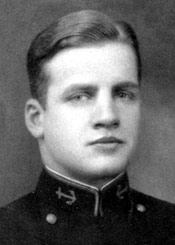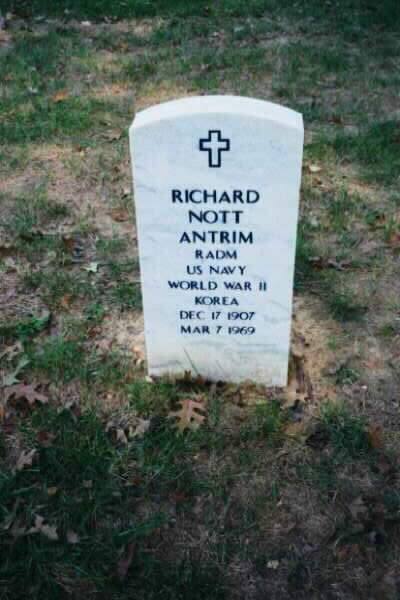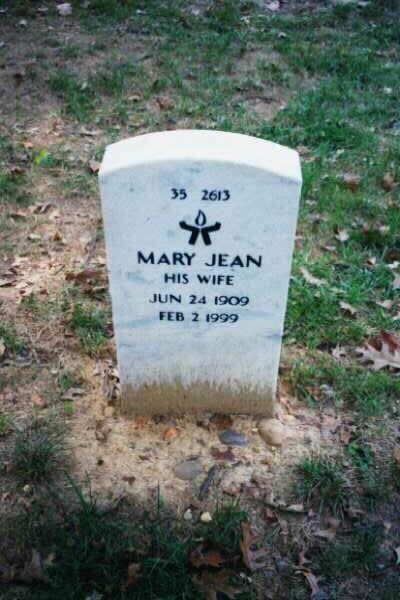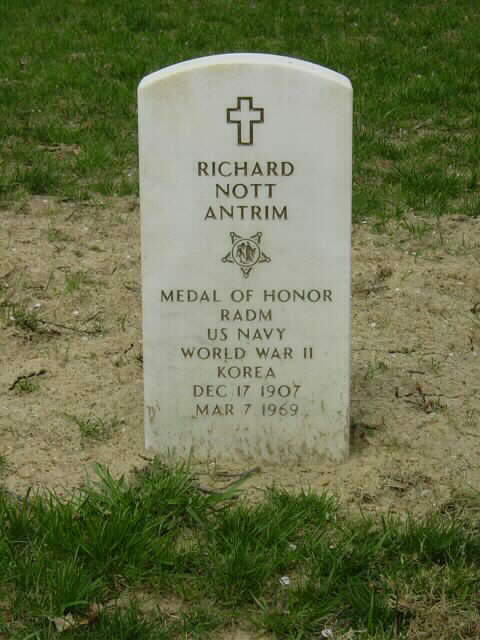Born at Peru, Indiana, on December 17, 1907, he earned the Medal of Honor during World War II in April 1942 at Makassar, Celebes, Netherlands East Indies.
United States Naval Academy Photo
He was serving as Executive Officer of the USS Pope which was sunk by the Japanese. He was the senior officer among the 150 members of the crew who survived the sinking and assumed command of the group. He organized the men and carefully distributed the meager remaining rations. Under his direction, all of his command survived until a Japanese destroyer pulled them from the sea a week later.
They were then taken to a prisoner-of-war camp at Makassat on the island of Celebes. Like all prisoners of the Japanese, they found themselves at the mercy of sadistically cruel prison guards. Because the Japanese military culture permitted no surrender, they considered their Allied prisoners to be subhuman for having been captured. Beaten or tortured for the slightest infraction of the camp’s many petty rules, the POWs lived in constant fear of their guards.
One day in April 1942, a Naval officer broke one of the rules when he failed to bow low enough to a guard. Infuriated at this supposed insult, the guard went into a frenzy. Grabbing his swagger stick, he began beating the officer. Again and again the club swung through the air, tearing human flesh.
Antrim, watching the beating with the other prisoners, finally had enough. In the preceding weeks he had seen too much cruelty, too much needless death. Something had to be done to halt the carnage. “Stop,” he commanded, stepping forward. Later, he wasn’t sure who was more stunned at this bold move, the guards or the other prisoners. By using Pidgin English and sign language, he convinced the guards to discuss the charges against the officer, now huddled nearly unconscious at their feet.
Soon the entire Japanese prison force assembled in the open yard of the compound. The 2,700 Allied prisoners stood silently by, unable to believe the events enfolding before their eyes. Antrim argued the officer’s case to the Japanese. The officer meant no insult, he told them. He explained that Americans were not used to bowing. They needed more time to learn Japanese customs. The camp commandant was unmoved by his pleas. With the prisoners waiting nervously, the commandant ordered the officer punished with 50 lashes. Fifteen blows with a length of heavy rope rained down on the man, driving him into unconsciousness. Three of the enlisted guards, intoxicated by the now-bloody body before them, began kicking the downed officer along the ground. Antrim was unable to control his fury and disgust. He stepped forward again and, in a bold, clear voice, he said, “I’ll take the rest.” Stunned silence fell over the entire compound.
The Japanese were amazed at Antrim’s maneuver. He repeated the offer, “I’ll take the lashes.” At that moment a robust, spontaneous roar erupted from the assembled prisoners. His actions were the bravest they had ever witnessed. The Japanese didn’t know what to do. After considering among themselves, the commandant indicated that the unconscious officer could be carried to the dispensary. He then bowed slightly to Antrim, saluting him for his willingness to sacrifice his own life for anothers. The POWs again roared their approval. His actions did not completely end the Japanese cruelty at the camp, but they did earn the POWs a respite from the senseless beatings, as well as bringing them a new respect from their guards.
A native of Peru, Indiana, Antrim had entered the United States Naval Academy in 1927, graduating in 1931. Commissioned as an Ensign he then undertook a series of routine shipboard assignments over the next 9 years. In 1940, he had the unusual distinction of qualifying as a dirigible pilot. He then joined the USS Pope as Executive Officer.
Once that the POWs were liberated in September 1945, his gallant conduct quickly became known. The Medal of Honor was presented to him on January 30, 1947. He had already been awarded the Navy Cross for heroism prior to the time that the USS Pope was sunk. He remained on active duty until ill health caused by his years as a POW forced his retirement in April 1954 as a Rear Admiral. He died on March 8, 1969 at Mountain Home, Arkansas, and was buried in Section 35 of Arlington National Cemetery.
My thanks to his loving daughter, Judy Antrim Laylon, for reminding me what a true American hero her dad was!
RICHARD ANTRIM, ADMIRAL, 61, DIES
Won Medal of Honor While Captive of Japanese in ‘42
MOUNTAIN HOME, Arkansas, March 8, 1969 – Rear Admiral Richard M. Antrim, retired, holder of the Medal of Honor, died yesterday at his home. He was 61 years old. Admiral Antrim, a native of Peru, Indiana, retired from the Navy in 1954.
He won the Nation’s highest award for valor for his action in saving the life of a fellow prisoner of war in a Japanese prison camp in April of 1942. President Harry Truman made the presentation in 1947.
The Admiral, then a Lieutenant, was cited for acting in behalf of a Navy officer “who was subjected to a vicious clubbing by a frenzied Japanese guard.” The citation said Lieutenant Antrim attempted to quiet the guard and finally persuaded him to discuss the charges.
The citation read: “With the entire Japanese force assembled and making extraordinary preparations for the threatened beating, and with the tension heightened by 2,700 Allied prisoners rapidly closing in, Commander Antrim gallantly stepped forward and indicated to the perplexed guards that he would take the remainder of the punishment, throwing the Japanese completely off balance in their amazement and eliciting a roar of acclaim from the suddenly inspired Allied prisoners.
“By his fearless leadership and valiant concern for the welfare of another, he not only saved the life of a fellow officer and stunned the Japanese into sparing his own life, own also brought about a new respect for American officers and men and a great improvement in the camp living conditions.”
Admiral Antrim is survived by his widow, a son, and two daughters.
Burial will be Tuesday at Arlington National Cemetery.
In addition to the Medal of Honor, Admiral Antrim was awarded the Bronze Star for deceiving his captors in the construction of air-raid trenches at the camp.
Under the eyes of the Japanese, who failed to discover the trick, the trenches were dug in the shape of a giant U.S.
The feat aided Allied air photographers and probably spared the prisoners bombing raids.
Lieutenant Antrim, a graduate of the United States Naval Academy, was captured after the destroyer Pope was put out of action in a running three-hour battle with Japanese warships and aircraft between Java and Borneo early in 1942.
He was interned with other survivors in the Netherlands East Indies and returned to the United States in the autumn of 1945.
Before the war, he was assigned to the Navy Air Station at Lakehurst, New Jersey, as a dirigible commander.
ANTRIM, MARY JEAN
DATE OF BIRTH: 06/24/1909
DATE OF DEATH: 02/02/1999
DATE OF INTERMENT: 02/09/1999
BURIED AT: SECTION 35 SITE 2613
ARLINGTON NATIONAL CEMETERY
WIFE OF ANTRIM, RICHARD NOTT RADM US NAVY
ANTRIM, RICHARD NOTT
RADM US NAVY
VETERAN SERVICE DATES: 04/02/1934 – 04/10/1954
DATE OF BIRTH: 12/17/1907
DATE OF DEATH: 03/07/1969
DATE OF INTERMENT: 03/11/1969
BURIED AT: SECTION 35 SITE 2613
ARLINGTON NATIONAL CEMETERY
Michael Robert Patterson was born in Arlington and is the son of a former officer of the US Army. So it was no wonder that sooner or later his interests drew him to American history and especially to American military history. Many of his articles can be found on renowned portals like the New York Times, Washingtonpost or Wikipedia.
Reviewed by: Michael Howard




